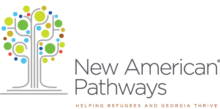The walls of Doris Mukangu’s office are covered in photos of African women in various states of work – farming, carrying heavy burdens, selling in local bazaars, and more. The images, part of the “Dignity in Labor” series by her co-worker, Reggie Erawoc, perfectly encapsulates Doris and her organizations, Amani Women’s Center and Johari Africa.
Doris, through her work, seeks to empower women with the strength and dignity to build their own knowledge and power to become more successful in their new home of Clarkston. Johari Africa, and by extension Amani Women’s Center, help show refugee women that “other people do appreciate the vibrancy of their work,” Doris says. “It makes them feel good.”
When Doris first came to the United States from Kenya, she had her plans laid out. A student at the University of Auburn – Montgomery, Doris was studying medical technology. She went on to a successful career in a community clinic in Atlanta but, somewhere inside, she knew that wasn’t the life for her. It was when she started volunteering at the DeKalb Board of Health that everything changed.
Although her native country is home to the world’s largest refugee camp, Doris said she never really understood the refugee life before working with the people she met in DeKalb County. She realized providers were frustrated with their patients, who weren’t taking medications as prescribed. Doris quickly found the answer to their problems: the well-meaning providers lacked the proper translation and cultural understanding for their recently-arrived African patients. That’s where her idea for Amani Women’s Center was born.
I was so happy “doing something that actually made a difference,” she says of her time at the Board of Health, where she helped providers better communicate with new arrivals. So, when she realized her skills in cultural sensitivity and translation could make an even larger impact for the community, she and a friend formed Amani (which means ‘peace’ in Swahili) to deliver unique and culturally sensitive workshops for refugees and immigrants and to bridge the gap between providers and patients.
Since then, Amani has grown to serve refugees around the world and to navigate complicated cultural norms around health – especially women’s health. When clients may be hesitant to talk about HIV and other sexually transmitted disease, Doris moves to a “Women’s Wellness” workshop model to talk about nutrition and more – with some sexual health thrown in. Now a graduate of Emory’s School of Public Health, Doris is becoming an expert in how to navigate the community to get the best results for clients. It was this very dedication to her clients that led to the formation of Amani’s “social enterprise arm,” Johari Africa.
Doris realized many of the women she served were stay-at-home moms who often did not feel comfortable going out about town, but they wanted to do something to contribute to their family. She began her outreach slowly – by giving clients a bracelet to bead or teaching them to sew a pattern to create an item of clothing. Once the women built the skill, they had a chance to earn their own spending money from the comfort of their home, a facet of her program that still holds true.
“I liked the excitement it brought – the dignity to this woman who never thought she could contribute before,” Doris says of the program in its early stages. “Now they started to feel empowered to have a voice at the table.”
Now, Johari is thriving – selling eco-friendly items such as handbags, dresses, jewelry and more that celebrate the African cultures of the women who create them. Recently, they’ve kicked off a sewing-room project for women to build basic skills so they, too, can one day be their own boss from home.
Most importantly, Doris has seen the empowerment of the moms pass down to their daughters. Young girls in the family realize their mothers aren’t helpless and that they don’t have to rely on their fathers for an income. The cycle of strength and dignity continues from one generation to the next.
You can purchase items from Johari Africa at local festivals, on their website, or by calling ahead to visit their office, which is located in Clarkston.
Johari Africa is always in need of additional sewing machines, fabric and thread. To contact Doris about in-kind donations and volunteering with the program, contact her at doris.amaniwomenscenter@gmail.com or her co-worker Reggie at reggie.awc@gmail.com.
